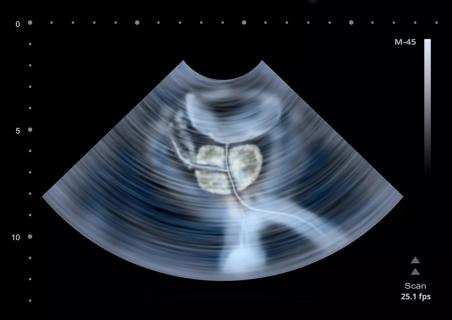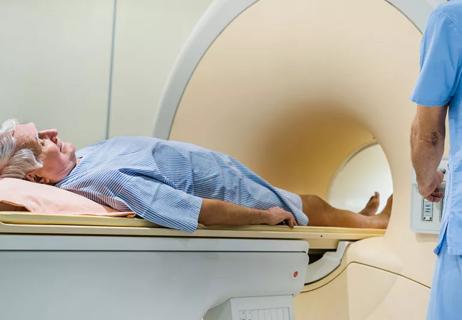Family history and genetics may heighten your risk for prostate cancer

Your father had prostate cancer, and so did his father before him. And maybe you even have a history of breast cancer in your family. So, you may be especially interested in exploring your own risk of developing cancer.
Advertisement
Cleveland Clinic is a non-profit academic medical center. Advertising on our site helps support our mission. We do not endorse non-Cleveland Clinic products or services. Policy
It’s always important to understand your family’s medical history, including your family’s entire cancer background regardless of their sex. Having a biological family history of prostate cancer (especially aggressive prostate cancer), along with breast cancer and other malignancies, may increase your odds of developing prostate cancer yourself.
When your healthcare provider considers your family history and other risk factors to gauge your overall risk of prostate cancer, they can guide you on decisions regarding prostate cancer screening and treatment, as well as any need for genetic testing and counseling.
“It’s helpful to ask which of your relatives has had cancer, what type of cancer they were diagnosed with, and what ages those relatives were when they were diagnosed with cancer,” says urologist Samuel Haywood, MD.
“If you have a family history of prostate cancer or breast, ovarian, pancreatic or colorectal cancer, I would encourage you to discuss this information with your healthcare provider to see if genetic counseling and testing are appropriate so you can determine what options are available for cancer screening for you and other members of your family.”
It’s also important to understand that having a genetic predisposition for cancer doesn’t guarantee you’ll develop prostate cancer, nor does having a family history of prostate cancer necessarily confirm the presence of a genetic mutation or syndrome.
Advertisement
Rather, your family history can be used as a screening tool for prostate cancer and inform whether you should be referred to a genetic counselor. Your healthcare provider will consider the following factors to assess your risk of prostate cancer:
Considering these factors, most experts recommend that discussions about screening with prostate-specific antigen (PSA) and other tests begin at ages 50 or 55 for those at average risk, but earlier for higher-risk groups.
Inherited genetic mutations and syndromes cause between 5% and 10% of prostate cancers, according to the American Cancer Society. One of them, Lynch syndrome, triggers mutations in DNA repair genes that increase the risk of early-onset colorectal cancer and, potentially, prostate cancer.
Similarly, a rare mutation in a gene (HOXB13) that plays a key role in the development of the prostate gland has been linked to early-onset and hereditary prostate cancer. Changes in other genes are being studied for their role in prostate cancer development.
Inherited prostate cancer arises not only from the males in your family, but also from your female relatives. For instance, in some families, breast or ovarian cancers result from hereditary breast and ovarian cancer syndrome (HBOC), characterized by mutations in the BRCA1 and BRCA2 genes. Found in about 1 in 400 people, BRCA mutations also increase the risk of:
Notably, these HBOC mutations, especially BRCA2, are responsible for the majority of hereditary prostate cancers.
“It’s important to know about BRCA2 because BRCA2-associated prostate cancers are some of the most aggressive,” explains Eric Klein, MD, Chairman of the Glickman Urological & Kidney Institute. “It’s important to know about your family history and know how many affected people you have in your family.”
Guidelines created by members of an international panel of experts recommend that males with BRCA2 or HOXB13 mutations begin PSA screening at age 40 or 10 years before the youngest age at which prostate cancer was diagnosed in the family. Those people should be screened yearly or at an interval based on the baseline PSA test. The guidelines also recommend that screening begin at age 45 for males with BRCA1 mutations.
Advertisement
Your familial risk of prostate cancer is greatest if you have a first-degree relative (father or brother) who had the disease, especially if they were diagnosed at a relatively young age. Having multiple first-degree relatives with prostate cancer also increases risk. Having multiple second-degree relatives (such as a grandfather, uncle or half-brother) and third-degree relatives (like a great-grandfather or cousin) adds to the risk, Dr. Haywood explains.
“It’s more concerning when we see all cancers on one side of the family, in one blood line,” he says.
In one study, researchers found that men with a brother who had prostate cancer were more than twice as likely as men in the general population to be diagnosed with the disease themselves, and they faced nearly twice the risk of developing aggressive prostate cancer by age 75. Also, men with both a father and brother who had prostate cancer faced about a threefold greater risk of prostate cancer and developing aggressive disease by age 75 compared with the general population.
Experts recommend that anyone who has a prostate and a family history suggesting an increased risk of prostate cancer should engage in shared decision-making with their physicians about genetic counseling and testing.
Advertisement
Genetic testing can educate you about your inherited risk of prostate cancer. It also can inform your family members that they may have genetic mutations that increase their cancer risk. Here are seven factors that warrant a referral to a certified genetic counselor:
Genetic testing for any condition can be scary, but knowing your options and having an idea of what the potential future holds may be an informative experience at the very least.
Advertisement
“For people that qualify for genetic testing, it’s a quick test that may not only help your treatment decisions, but it can also help inform your family regarding their risk,” reiterates Dr. Haywood.
“Many people are worried about undergoing testing, but there are significant benefits to understanding the health risk to you and your family members.”
Learn more about our editorial process.
Advertisement

Possible signs include slow urine flow and loss of bladder control — but if this common cancer is caught before it spreads, the prognosis is good

You don’t have to cope in silence with issues like urinary incontinence and sexual dysfunction

Check-in with your care team, and focus on low-impact exercises and walking for good gains

Sex may be different after prostate cancer treatment, but it can still be enjoyable

Yep! Research shows a possible connection

Not following recommended follow-ups could put you at risk

High-intensity focused ultrasound (HIFU) provides new treatment options

MRI improves detection, but it's not yet a substitute for standard biopsy

Wearing a scarf, adjusting your outdoor activities and following your asthma treatment plan can help limit breathing problems

Your diet in the weeks, days and hours ahead of your race can power you to the finish line

When someone guilt trips you, they’re using emotionally manipulative behavior to try to get you to act a certain way